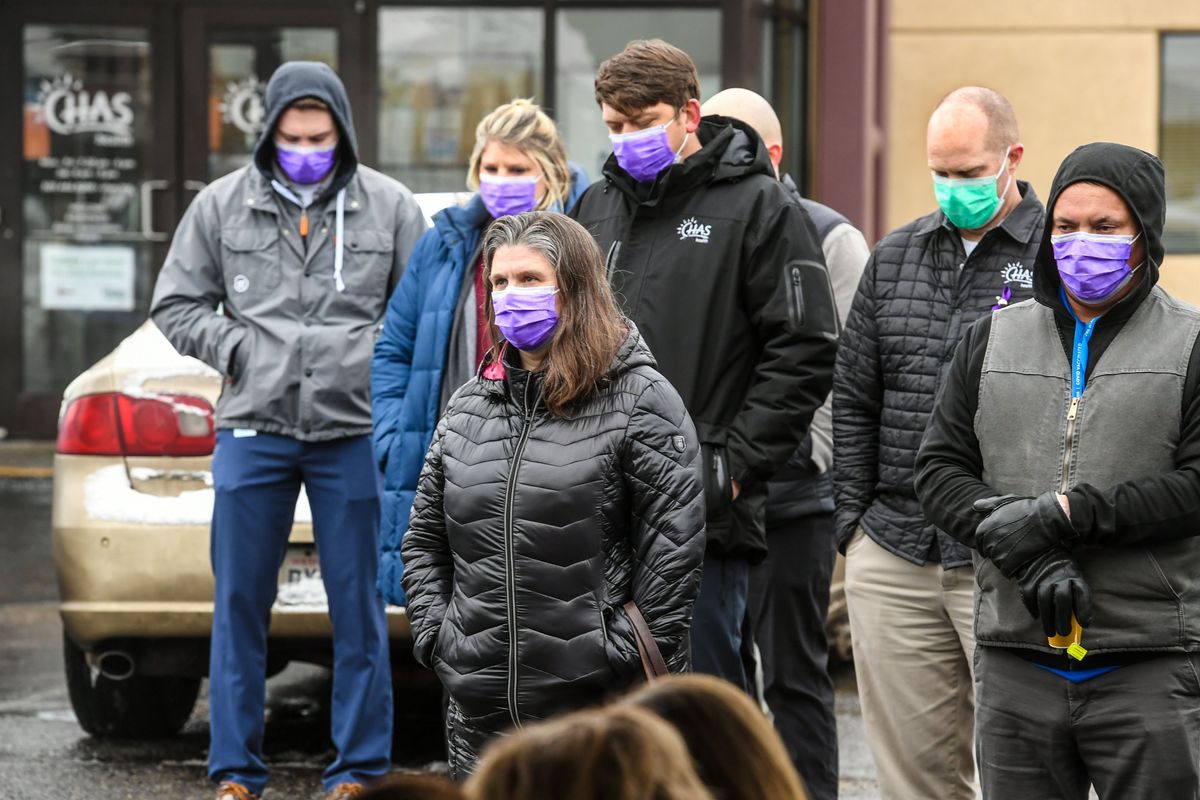This column reflects the opinion of the writer. Learn about the differences between a news story and an opinion column.
Shawn Vestal: A brutal year on the streets for those who died without a place to live

It seemed as if the list of names would not end.
At the end of a year in which our humanitarian crisis of homelessness has seemed to worsen steadily, the number of those who died here last year without a place to sleep – unnamed, unrecognized and alone – rose dramatically from last year as well.
At a memorial service Tuesday morning at CHAS Health’s Denny Murphy Clinic, 162 people who were homeless when they died were named and remembered, a sobering procession of names read out by people who work with and live among the homeless.
Last year, the memorial service named 91 people.
“It is the highest number we have tracked since we started doing the memorial” about 15 years ago, said Kelley Charvet, chief administrative officer for CHAS.
More than 100 people, including Mayor Nadine Woodward, showed up for the memorial outside the downtown clinic. The event is always held outdoors, Charvet said, “to put ourselves in the shoes of the homeless in winter.”

The service, which CHAS holds yearly, offers a chance to humanize and offer respect in death to people who are often dehumanized and demonized, as well as the opportunity to remind the community of the degree of need that is going unmet.
“We need to come together as a community, as we are doing right now, to improve our efforts to end homelessness,” said John Browne, chief financial officer for CHAS.
Browne noted that even our ability to accurately assess the size of our homeless population is unreliable. The annual point-in-time count showed about 1,500 homeless people in the city, far below state estimates and the anecdotal experience of many who work in shelter services and homeless outreach.
“Our outreach team can attest that we know the number to be much higher,” Browne said.
The service included a video in which a man who has experienced homelessness himself, Jeremy D’Agostino, spoke about the difficult realities of life on the streets.
“Just being homeless can cause someone to suffer PTSD,” he said. “Every day is a traumatic event.”
He continued, “Today the hardest thing to combat when you’re homeless is not getting harassed, by not just homeless people – but, like, it’s pouring down rain or something like that and they’re kicking everybody out from under the tunnels, the bridges. Where else are they supposed to go? They’re trying to stay dry. They’re trying to survive.”
Dr. Deb Wiser, chief clinical officer at CHAS Health, talked about the monumental challenges for homeless people to get health care for serious illness or injury. She said that no one who sleeps on a sidewalk can begin to address the other problems in their lives – whether that’s addiction, or mental illness, or obtaining treatment for an injury, or finding a job.
“My conclusion: Housing is health care,” she said on the video. “Housing empowers people for physical and mental wellness and access to care. It helps them find work and get an education in the field they need to get back to a normal life. Our street medicine team provides amazing services for patients on the street needing help but the reality is there’s only so much they can do when a person doesn’t have the most basic need: A roof over their head.”
The service concluded with those in attendance ringing a bell – one for each person who died – to signify “our commitment to a world where no life is lived or lost in homelessness,” said Ilze Zarins-Ilgen, who has been working on the CHAS outreach program for 14 years, making connections with people on the streets and helping them in myriad ways.
The names of those memorialized are gathered from a variety of sources all during the year: information gleaned by outreach teams and others who work with the homeless population both at CHAS and similar organizations, as well as from the police and other sources.
Sabrina Bukowski, who is an outreach worker for CHAS, said holding a memorial service for homeless people is important for the very same reasons that it’s important to hold a memorial service for people who aren’t homeless.
“People do die out here,” she said. “Sometimes it’s old age. Sometimes it’s drugs. Sometimes it’s the weather. They deserve to be honored just as much as anyone else does.”